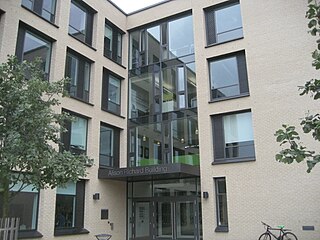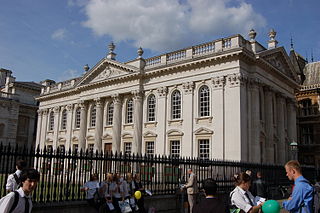MetaComCo (MCC) was a computer systems software company started in 1981 and based in Bristol, England by Peter Mackeonis and Derek Budge. A division of Tenchstar, Ltd.

The cd
command, also known as chdir
, is a command-line OS shell command used to change the current working directory in operating systems such as Unix, DOS, OS/2, TRIPOS, AmigaOS, Microsoft Windows, ReactOS, and Linux. It can be used in shell scripts and batch files. The command is also available in the open source MS-DOS emulator DOSBox and in the EFI shell. The command is named chdir
in MPE/iX.

In computing, dir (directory) is a command used for computer file and directory listing.
The mkdir command in the Unix, DOS, FlexOS, OS/2, Microsoft Windows, and ReactOS operating systems is used to make a new directory. It is also available in the EFI shell and in the PHP scripting language. In DOS, OS/2, Windows and ReactOS, the command is often abbreviated to md.

At the University of Cambridge in England, a "Wrangler" is a student who gains first-class honours in the third year of the University's undergraduate degree in mathematics. The highest-scoring student is the Senior Wrangler, the second highest is the Second Wrangler, and so on. At the other end of the scale, the person who achieves the lowest exam marks while still earning a third-class honours degree is known as the wooden spoon.
In computing, echo is a command that outputs the strings it is being passed as arguments. It is a command typically used in shell scripts and batch files to output status text to the screen or a computer file, or as a source part of a pipeline.
The Natural Sciences Tripos (NST) is the framework within which most of the science at the University of Cambridge is taught. The tripos includes a wide range of Natural Sciences from physical sciences to biology which are taught alongside the history and philosophy of science. The tripos covers several courses which form the University of Cambridge system of Tripos. It is known for its broad range of study in the first year, in which students cannot study just one discipline, but instead must choose three courses in different areas of the natural sciences and one in mathematics. As is traditional at Cambridge, the degree awarded after Part II is a Bachelor of Arts (BA). A Master of Science degree (MSci) is available to those who take the optional Part III. It was started in the 19th Century.

The Mathematical Tripos is the mathematics course that is taught in the Faculty of Mathematics at the University of Cambridge. It is the oldest Tripos examined at the University.
The University of Cambridge was the birthplace of the 'Analytical' School of Philosophy in the early 20th century. The department is located in the Raised Faculty Building on the Sidgwick Site and is part of the Cambridge School of Arts and Humanities. The Faculty achieved the best possible results from The Times 2004 and the QAA Subject Review 2001 (24/24). It is ranked first in the UK by the Guardian.

The University of Cambridge Department of Engineering is the largest department at the University of Cambridge and one of the leading centres of engineering in the world. The department's aim is to address the world's most pressing challenges with science and technology. To achieve this aim, the department collaborates with other disciplines, institutions, companies and entrepreneurs and adopts an integrated approach to research and teaching.
In computing, ren is a command in various command-line interpreters (shells) such as COMMAND.COM, cmd.exe, 4DOS, 4NT and Windows PowerShell. It is used to rename files and in some implementations also directories. It can also move a file to a new path, if it is on the same device. It is analogous to the Unix mv command.

In computing, type is a command in various command-line interpreters (shells) such as COMMAND.COM, cmd.exe, 4DOS/4NT and Windows PowerShell used to display the contents of specified files on the computer terminal. The analogous Unix command is cat.
In computing, copy is a command in various operating systems. The command copies computer files from one directory to another. The destination defaults to the current working directory. If more than one source file is indicated, the destination must be a directory.

The Faculty of Human, Social, and Political Science at the University of Cambridge was created in 2011 out of a merger of the Faculty of Archaeology and Anthropology and the Faculty of Politics, Psychology, Sociology and International Studies. According to the Cambridge HSPS website: graduates pursue careers in "research, the Civil Service, journalism, management consultancy, museums, conservation and heritage management, national and international NGOs and development agencies, the Law, teaching, publishing, health management, and public relations."
The Department of History and Philosophy of Science (HPS), of the University of Cambridge is the largest department of History and Philosophy of Science in the United Kingdom. It received a maximum rating of 4* for the majority of its submissions to the RAE 2008 Research Assessment Exercise. Located in the historic buildings of the Old Physical Chemistry Laboratories on Free School Lane, Cambridge, the Department teaches undergraduate courses towards the Cambridge Tripos and graduate courses including a taught Masters and PhD supervision in the field of HPS. The Department shares its premises with the Whipple Museum and Whipple Library which provide important teaching resources for its teaching and research.
In computing, diskcopy is a command used on MS-DOS, PC DOS, FlexOS, 4690 OS, TRIPOS, PTDOS, AmigaDOS, PC-MOS, PTS-DOS, FreeDOS, OS/2, and Microsoft Windows for copying the complete contents of a diskette to another diskette.
Thomas Gaskin (1810–1887) was an English clergyman and academic, now known for contributions to mathematics.

The Faculty of History is one of the constituent departments of the University of Cambridge. The Faculty is divided into eight subject groups : American History; Ancient and Medieval History; Early Modern History; Economic, Social and Cultural History; Modern British History; Modern European History; Political Thought And Intellectual History; and World History.








